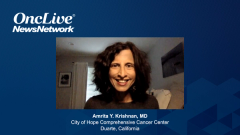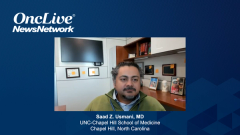
Relapsed/Refractory MM: Results From the BELLINI Study
Insight on the BELLINI study, which added venetoclax to bortezomib and dexamethasone for patients with relapsed/refractory multiple myeloma.
Episodes in this series

Transcript:
Saad Z. Usmani, MD: Venetoclax is a highly selective potent oral BCL2 inhibitor. We know that myeloma is a cancer that has terminally differentiated plasma cells that do typically express elevated levels of anti-apoptotic proteins, including BCL2. What has been seen in the preclinical domains, specifically for patients with translocation 11;14 or BCL2 overexpression, there’s preclinical rationale to utilize venetoclax in multiple myeloma. We saw early single-agent activity along with the combination of dexamethasone in single-arm studies that were reported several years ago. We’ve also seen earlier studies combining protease inhibitors with venetoclax and dexamethasone showing good clinical activity, specifically pronounced in the translocation 11;14 or BCL2 overexpressing patients.
The BELLINI trial was a randomized phase 3 study. It was a double-blind multicenter study that combined either venetoclax or placebo with bortezomib and dexamethasone for patients who had relapsed/refractory myeloma with 1 to 3 prior lines of treatment. The patients had to be sensitive to proteasome inhibitors. The randomization was 2:1, so for every single patient going on bortezomib, dexamethasone, and the placebo, 2 went on to receive venetoclax. The study was halted by the FDA, I believe a couple of years ago, in fact 2019 if I recall, so we are getting to 3 years now, because of the high number of deaths in the venetoclax arm. When the investigators really dove down into the data, they saw that there was a clear PFS [progression-free survival] benefit. That PFS benefit was coming from the patients who had translocation (11;14) and BCL2 overexpression, whereas you were not seeing the same benefit for the patients who did not have those features. In fact, that’s the group where there was a higher number of deaths seen on the venetoclax arm.
The final OS [overall survival] analysis was presented by my colleague, Shaji Kumar, [MD]. He had shown that adding venetoclax to bortezomib does show PFS benefit, but it does increase mortality versus placebo in the overall patient population. Consistent with previous results, he reported that adding venetoclax to bortezomib, dexamethasone shows the greatest PFS improvement in patients with translocation (11;14) or BCL2 overexpression. It warrants further investigation, and that’s probably where the benefit-to-risk profile looks the most favorable. I hope that we are able to continue to develop venetoclax for these patients, either with proteasome inhibitors or with other drug classes, but develop this as a biomarker-driven therapy just for that subgroup of patients who benefited.
Transcript edited for clarity.






































